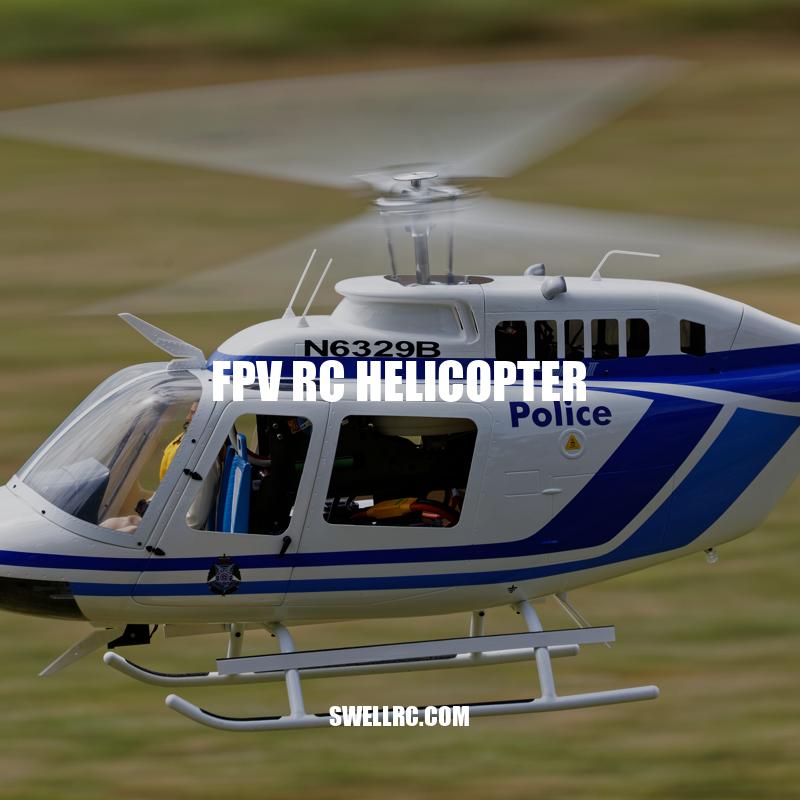Exploring the Exciting World of FPV RC Helicopters
FPV RC helicopters have become increasingly popular in recent years, attracting both hobbyists and professionals alike. These remote-controlled devices use FPV (first-person view) technology to give pilots a more immersive experience as they fly the helicopter from a first-person perspective. The FPV system consists of several components, including the aircraft itself, a remote controller, a camera, and a pair of goggles that display the camera’s live stream. FPV RC helicopters offer better control, precision, and safety than traditional RC helicopters, making them ideal for various purposes, from racing and entertainment to aerial photography and videography. In this article, we’ll explore FPV RC helicopters in more detail, covering what they are, the different types available, their features, racing and photography applications and their benefits.
What is FPV RC Helicopter?
- An FPV RC helicopter is a remote-controlled helicopter equipped with a camera and a screen or goggles to enable pilots to fly the helicopter from a first-person perspective.
- The FPV system includes a camera attached to the helicopter, a remote controller, and a screen or goggles that display the real-time camera feed.
- The remote controller sends signals to the helicopter, controlling its movement and speed.
- FPV RC helicopters offer a more immersive flying experience than traditional RC helicopters.
- They enable pilots to navigate through tight spaces, avoid obstacles, and fly at high speeds with greater precision and safety.
- FPV RC helicopters are used for various purposes, including entertainment, racing, and aerial photography.
- There are several online resources and websites that cater to FPV RC helicopter enthusiasts, providing information, forums, and reviews of different models and accessories, such as dronesinsite.com and RCgroups.com.
What are some uses for FPV RC helicopters?
Some uses for FPV RC helicopters are aerial photography and videography, search and rescue operations, surveying land and crops, wildlife monitoring, and recreational hobby flying.
Types of FPV RC Helicopter
- Quadcopters: The most common type of FPV RC helicopter with four rotors, offering stability and agility.
- Hexacopters: FPV RC helicopters with six rotors, providing additional lift and stability, making them perfect for heavy camera set-ups.
- Octocopters: FPV RC helicopters with eight rotors, offering superior stability and better control in high winds and adverse weather conditions.
| Type | Advantages | Disadvantages |
|---|---|---|
| Quadcopters | Easy to fly, stable, and agile. | Less lift capacity, less stable in high winds. |
| Hexacopters | Better lift capacity, more stable with heavy payloads. | More expensive, more complex to operate. |
| Octocopters | Superior stability and control in high winds, greater lift capacity. | Expensive, heavier, potential safety concerns with eight blades. |
- The type of FPV RC helicopter chosen will depend on the intended use, budget, experience, and personal preference.
- Quadcopters are the most popular among beginners and hobbyists, while hexacopters and octocopters are more suited for professional or commercial use.
- There are various online stores and marketplaces where you can purchase FPV RC helicopters, including Amazon, DJI, and HobbyKing.
What factors should be considered when choosing a type of FPV RC helicopter?
The factors that should be considered when choosing a type of FPV RC helicopter include the level of experience of the pilot, the desired flight time, the size and weight of the helicopter, the features and functions available, the quality and durability of the materials used, and the overall cost.
Features of FPV RC Helicopter
- Altitude hold: Maintains the altitude of the helicopter without pilot input, allowing for smoother movements.
- GPS positioning: Uses a satellite system to provide accurate position data, helping pilots navigate and maintain control of the helicopter.
- Obstacle avoidance: Uses sensors to detect and avoid obstacles in the path of the helicopter, improving safety.
- Auto Return Home: If the helicopter loses connection with the remote controller, it will automatically return to its takeoff point to prevent crashes and damage.
- Headless Mode: Allows pilots to fly the helicopter without worrying about orientation, as the controller can orient it to the position relative to the controller, making it easier for beginners to pilot.
- Camera Stabilization: Some FPV RC helicopters have built-in camera stabilization features, such as gimbal systems or electronic image stabilization, ensuring smooth, clear footage.
- FPV RC helicopters with more advanced features tend to be pricier than basic models.
- Manufacturers such as DJI, Holy Stone, and SYMA offer FPV RC helicopter models with various features to suit a range of users and budgets.
- There are numerous resources online, including forums, blogs, and YouTube channels, where users can learn more about FPV RC helicopters and get tips for operation and maintenance.
- Some online marketplaces like Amazon offer comparison tools to help customers compare various FPV RC helicopter models.
What are some recommended manufacturers and resources for FPV RC helicopter enthusiasts?
Some recommended manufacturers and resources for FPV RC helicopter enthusiasts are Blade, DJI, Horizon Hobby, Rotor Riot, Oscar Liang, and FPV Know-It-All.
FPV RC Helicopter Racing
- FPV RC helicopter racing has become a popular hobby and competitive sport in recent years.
- Competitions and events are held worldwide, and local clubs offer opportunities for beginners to learn and practice.
- Racers must fly their FPV RC helicopters through obstacle courses, maneuvering through gates and hoops as quickly and accurately as possible.
- Skills required for successful FPV RC helicopter racing include hand-eye coordination, reflexes, and precision flying.
- Racers can use online resources such as forums and blogs to learn more about the sport and get tips on how to improve their performance and equipment.
- FPV RC helicopter racing drones can vary in price based on features, performance, and quality. Some popular brands include Rotor Riot, T-Motor, and Fat Shark.
What skills are necessary for successful FPV RC helicopter racing?
The necessary skills for successful FPV RC helicopter racing include hand-eye coordination, quick reflexes, good spatial awareness, knowledge of the equipment and aerodynamics, and the ability to maneuver through obstacles at high speeds.
FPV RC Helicopter Photography
- FPV RC helicopters can be used for aerial photography and videography, offering a unique perspective for capturing footage from the air.
- Advantages of using an FPV RC helicopter camera for photography include getting up-close shots, flying through tight spaces, and avoiding obstacles like buildings and trees.
- FPV RC helicopters are used for aerial photography in industries like real estate, agriculture, and environmental monitoring.
- Pilots can use different types of cameras, such as action cameras or DSLRs, depending on their needs and preferences.
- Specialized FPV RC helicopter gimbals can be used to stabilize the camera and reduce the jittery effect that is common in aerial footage.
- Some popular brands for FPV RC helicopter photography equipment include DJI, GoPro, and Skyzone.
What are some popular brands for FPV RC helicopter photography equipment?
DJI, Fat Shark, and GoPro are some popular brands for FPV RC helicopter photography equipment.
Conclusion
In conclusion, FPV RC helicopters can offer a thrilling and immersive experience for hobbyists, photographers, and racers alike. From the advanced technology features to the multiple types of FPV RC helicopter available in the market, this remote-controlled device has taken the world of air flight by storm. With the advancements in technology, FPV RC helicopters continue to become more sophisticated, capable, and user-friendly. However, it is important to note that when flying an FPV RC helicopter, safety should always be a priority. Pilots should abide by the rules of flying and take necessary precautions to ensure the safety of people and property.
In summary, whether someone is an experienced hobbyist or just starting, there are plenty of opportunities to enjoy the thrills and excitement of FPV RC helicopter flying, racing, and photographing. The possibilities are endless, and new technology advancements in this industry suggest that FPV RC helicopters will hold a promising future as they continue to enhance and transform our experience in flying and capturing high-quality aerial images.



